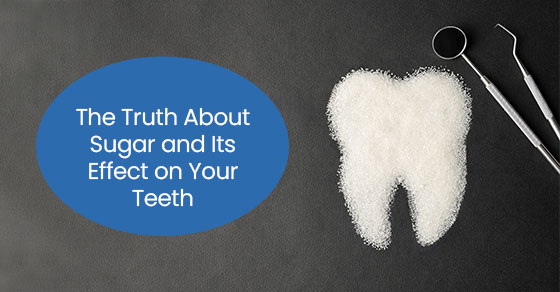You have likely heard that sugar causes cavities, but is that really the case? The science behind sugar and teeth is more complex. While it’s true that there is a direct link between sugar consumption and the formation of tooth decay, it’s inaccurate to say that sugar itself causes cavities. Oral bacteria is the real culprit.
Nonetheless, that does not mean that you can abandon your healthy eating habits and start eating a candy bar a day. Increased sugar intake has been proven to increase your risk of developing tooth decay. One of the easiest and best changes that you can make for your oral health is to minimize your sugar consumption.
Understanding Tooth Decay
Cavities are areas of tooth decay. This occurs when the protective outer layer of your teeth, called the enamel, is weakened by acid. Tiny holes form in the enamel, allowing bacteria to attack the inner tooth material. This is known as a cavity.
Your mouth is full of naturally occurring oral bacteria. Although it’s important to take steps to prevent bacterial overgrowth, you can never remove all the bacteria entirely. Nor would you want to! There are many beneficial microbes that also live in your mouth.
Stages of Tooth Decay
1. Plaque. Plaque is a clear, sticky biofilm consisting of bacteria, sugars, starches, saliva, and acids that adheres to the surface of your teeth. It forms when oral bacteria feeds on leftover food particles (like sugar) and secretes acid. Then, bacteria, remaining food particles, and acid combine to form plaque.
Plaque holds this harmful mix directly against your teeth. The acid attacks and slowly corrodes the protective tooth enamel. If unremoved, plaque hardens into tartar, which can only be removed with special dental tools.
2. Decay. Prolonged acid exposure decays the enamel. Tiny holes or openings (cavities) form in the worn-down enamel, which look like light brownish to dark brown spots. Bacteria and acid reach the next layer of your teeth, called the dentin. You may start to experience some tooth sensitivity.
3. Damage. Bacteria and acid continue to move deeper into the innermost layers of your tooth. Eventually, it reaches the tooth pulp at the centre of your tooth, which contains vital nerves and blood vessels. At this stage, it becomes a full bacterial infection. The pulp becomes swollen and irritated, with damage sometimes spreading down the tooth roots into the bone.
Sugar and Teeth
The bacteria in your mouth eats whatever and whenever you eat. Consequently, you need to be very careful what you’re feeding it (and how frequently).
Oral bacteria feeds on sugars, starches, and carbohydrates. This means that any food debris has the ability to cause bacterial overgrowth and cavities. However, certain foods act like superfoods for your oral bacteria, such as sugary foods, in particular.
Food that is high in sugar has more fuel for the bacteria to consume. It sends the bacteria into a feeding frenzy. This creates a highly acidic environment and accelerates the formation of plaque. The intensified attacks on your tooth enamel increase your risk of developing tooth decay, particularly if you consistently consume high amounts of sugar.
Protecting Your Teeth From Sugar
Limit or Eliminate Sugary Foods
You will never eliminate sugar from your diet entirely. In order to do so, you would have to stop eating all fruits and vegetables, which are essential for a long, healthy, and vibrant life. However, you can reduce your intake of highly processed, sugary foods and beverages. These food items lack the beneficial nutrients that accompany vegetables and fruits and dramatically increase your risk of cavities.
High-sugar snacks, candies, and beverages are linked to tooth decay. Sticky candies stick to your teeth, exposing the tooth enamel to more acid over a longer period of time. Sugary drinks, such as soda and sports drinks, effectively bathe your teeth in sugar every time you take a sip. Limiting your consumption of these food items will benefit your oral health significantly.
Drink More Water
Instead of reaching for a can of pop or a sports drink, opt for water instead. Water is essential for maintaining saliva production, which naturally rinses away bacteria and food debris. Drinking water also flushes your mouth, helping to keep oral bacteria in check.
Maintain Oral Hygiene Habits
You can minimize the impact of sugar in your diet by adopting healthy oral hygiene habits. Brushing your teeth twice a day and flossing removes plaque accumulation on, between, and around your teeth. When plaque is removed, it protects your enamel from bacterial acid attacks.
Additionally, be sure to visit Bristol Dental Clinic every six months for a thorough cleaning and comprehensive checkup. Our dental hygienists remove plaque and tartar buildup left behind by regular brushing to keep your teeth clean and healthy.
Treating Tooth Decay
Cavities are incredibly common. In fact, 96% of Canadians develop a cavity at some point in their life, even though cavities are largely preventable. This statistic highlights just how difficult it is to avoid tooth decay entirely.
Your mouth is a battleground, constantly fighting against the naturally occurring, harmful bacteria that threatens your oral health. Sometimes, the bacteria wins. Even a rigorous at-home oral hygiene regime is not a bulletproof (or bacteria-proof) strategy. Regular dental visits improve your odds of defying bacterial attacks. Thorough, professional dental cleanings remove the plaque and tartar buildups that brushing alone misses.
Nonetheless, cavities can still occur. When prevention fails, early treatment is essential. Small cavities only require minor, quick, minimally invasive, and inexpensive treatment. Identifying a cavity in this early stage is impossible without the expertise of your dentist. You won’t feel any pain or sensitivity in the affected tooth yet, so the only way to know that you have a cavity is through a professional examination and, sometimes, X-rays.
By the time you start to feel pain, the bacteria has already penetrated the dentin. If untreated, the infection can reach the innermost layer of your tooth and cause a deep infection. You will likely require a root canal or tooth extraction.
Regular dental visits identify cavities early, before the infection can progress. Instead of needing a root canal, you only need a small filling.
Professional Dental Care Helps Protect Your Teeth From the Effects of Sugar
Preventing cavities requires reducing your sugar consumption, maintaining your at-home oral hygiene habits, and visiting your dentist regularly. At Bristol Dental Clinic, we remove plaque and tartar accumulation to reduce your risk of tooth decay.
We also check for early signs of developing cavities, allowing us to intervene quickly with minimally invasive treatments. As a fully digital clinic, we offer the latest technology to provide the highest standard of dental care.
For more information on sugar and teeth issues or to book an appointment with a dentist in Mississauga, call Bristol Dental Clinic at 866-673-2109 or contact us here.





